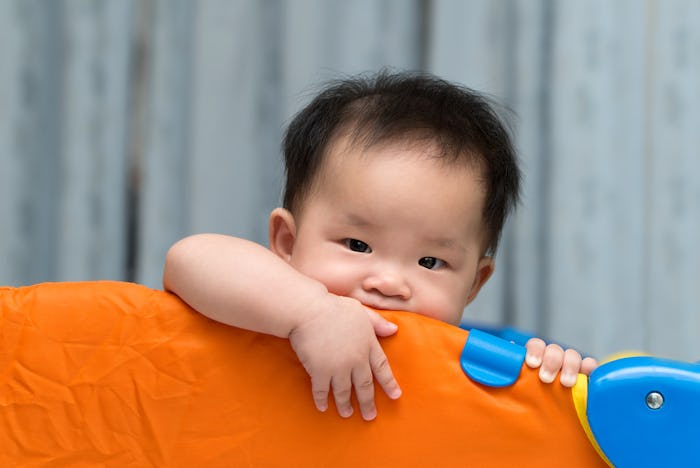Life

Why Does Your Baby Hate Their Playpen?
You need to get dinner on the table, but your baby's in her playpen, wailing like a banshee. All her favorite toys are inside the walls of the jungle-themed hexagon you bought at Babies 'R Us, but those toys are dead to her. She wants out, and she wants out now. You're probably wondering, why does my baby hate their playpen? As noted in Slate, the playpen debate is endless, but this is a no-judgment zone. Dinner's got to get done somehow.
In search of insight, Romper spoke with Dr. Marcie Beigel, a behavior specialist with over 20 years of experience. For Dr. Marcie, it's all about being intentional. If your kid throws a tantrum every time she gets in the playpen, she associates the space with being upset. Likewise, it doesn't matter how well you've stocked your playpen with toys if every time she gets in it, mom disappears. If you want to change the pattern here, "you have to make the space really fun and delicious and enjoyable," says Dr. Marcie.
So, how do you go about changing tantrum central into Mr. Roger's Neighborhood? Dr. Marcie suggests using the playpen when it isn't necessary — and not just when you have to get dinner on the table or take that important call. "Sit on the outside and read them a book," she says. "Walk away for a minute, then come back, so they realize, oh, it's just a moment that you disappear." Build it up as a fun space, singing her songs and talking to her. When it comes to transforming a place, "it's not about the stuff, but about the level of engagement," says Dr. Marcie.
In her work, Dr. Marcie strongly emphasizes thoughtful strategy over the chicken-with-its-head-cut-off reactions that never fail to make parents — and children — miserable. Following three simple rules can make all the difference in how you relate to your kids.
Personally, I was super eager to hear these rules. My baby is 7 months old and crawling, and lately, I'm starting to get the feeling that when it comes to this whole parenting thing, I don't have clue.
Rule one? "Speak with purpose, because your words matter." Parents often use language casually, but if you always speak with purpose, your kids will always know just what to expect.
Rule two? "Do more, because actions count." If you tell your kid you're going to do something, be like Nike and just do it. Parents give a lot of direction when they're unprepared — which is why you have to ask your kid to sit down for a snack like 37 times. Instead, what if you waited until their ants-on-a-log was already on the table, grabbed your little one, and sat them down yourself? According to Dr. Marcie, that helps them learn what it means to listen.
Most people take life too seriously, and part of doing more is having more fun. To treat mild-to-moderate cases of over-seriousness, Dr. Marcie prescribes the three-minute dance party. After three-minutes of awesome silliness, going out to dinner may well be an entirely different experience.
Rule three? "Choose honey, because perspective is powerful." Dr. Marcie explains,
"We're in a culture where there’s so much negativity everywhere. Kids are often told no and stop and don’t and it’s all these corrections, which doesn’t feel good to any of us. It doesn’t feel good as a parent saying it, and it doesn’t feel good to the child receiving it."
So switch out "stop running" with "come walk with me." After all, it's much nicer to encourage your kids to do better, than to harp on what they're doing wrong.
For Dr. Marcie, you can't start practicing too early. While your baby's in the womb, you can begin building habits that will work not only when things are fine and lovely, but also when you're facing an epic potty-training crisis. Building a solid foundation for interacting with your kids can make life a lot more fun, because you know what to expect — and so do they.
The bottom line? You can change your child's behavior with some thoughtful advance planning. If you need your baby to play quietly in her playpen for a few minutes each day (because dishes don't wash themselves, right?), spend some quality time with her there, and emphasize the play.